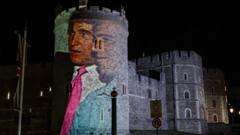Is America Facing a Dangerous Crossroads After the Charlie Kirk Shooting?

Published: 2025-09-18 04:25:19 | Category: technology
In recent days, America has faced increasing division and violence following the shocking assassination of conservative commentator Charlie Kirk. This tragic event has reignited discussions about the nation's political climate and the role of social media in exacerbating tensions. Many worry that the cycle of hatred will continue, as historical precedents suggest that unity after tragedy is often fleeting.
Last updated: 27 October 2023 (BST)
Key Takeaways
- The political landscape in America is increasingly polarised, with historical context revealing a pattern of division following tragedies.
- Governor Spencer Cox of Utah has called for unity and reflection in light of Charlie Kirk's assassination.
- The role of social media in stoking violence and extremism has come under scrutiny, with calls for accountability from tech companies.
- While some political figures express hope for reconciliation, the current environment is marked by blame and division.
- Understanding the root causes of extremism may offer a pathway toward healing and unity.
The Context of Recent Violence
The past week has been particularly brutal for America, marked by the assassination of Charlie Kirk, a prominent conservative figure. His death has elicited calls for a reduction in political tensions, with Governor Spencer Cox urging Americans to engage in positive community actions rather than heated political discourse. This plea for calm, however, seems at odds with the lived experiences of many, who fear that such a shift is unlikely.
Historically, moments of violence in America have often failed to foster unity. The shooting of Democratic Congresswoman Gabrielle Giffords in Arizona in 2011 and the attack on Republican Congressman Steve Scalise during a baseball practice in 2017 serve as stark reminders of this pattern. Even the COVID-19 pandemic, a global crisis that impacted all Americans, did not bridge the political chasms but rather deepened them.
The Incentive Structure of American Politics
The underlying reasons for this persistent division can largely be attributed to the incentive structures within American politics and media. Candidates are often rewarded for adopting polarising stances that galvanise their respective bases rather than seeking common ground. Gerrymandering exacerbates this issue, creating safe districts that encourage extreme political behaviour.
Media organisations also play a crucial role in this dynamic. Outrage-driven content garners more views and, consequently, more advertising revenue. As a result, commentators tend to adopt more extreme positions, further fuelling societal discord.
Governor Cox's Call for Reflection
In the wake of Kirk's assassination, Governor Cox's message was one of reflection and community engagement. He encouraged Americans to "log off, turn off, touch grass, hug a family member, go out and do good in the community.” His sentiments stand in stark contrast to the prevailing trends in political rhetoric and social media engagement.
However, Cox did not shy away from addressing the role of social media in the current climate. He described it as a "cancer" on society, suggesting that online platforms have played a direct role in fostering the violence seen in recent years. This perspective reflects a growing concern among politicians and citizens alike about the impact of digital discourse on political violence.
The Role of Social Media in Political Violence
As various narratives surrounding Kirk's death emerged, discussions about the implications of social media intensified. Many commentators, including Cox, have pointed to the radicalisation that can occur within internet subcultures, while others argue against attributing blame to any single cause. This highlights the complexity of the issue and the need for a nuanced understanding of how online behaviour can translate into real-world violence.
Polarisation in the Aftermath of Tragedy
In the days following Kirk's death, political camps quickly retreated into familiar narratives. Many on the left have focused on exploring radicalisation through online platforms, while some on the right have suggested that the event may be part of a broader conspiracy. This binary thinking stifles possibilities for reconciliation and healing.
Examining the Root Causes of Extremism
Experts studying extremism suggest that the current political landscape cannot be fully understood through a left-right lens. Rachel Kleinfeld, a senior fellow at the Carnegie Endowment for International Peace, argues that it is more productive to examine the underlying causes of societal ungovernability. She highlights the need for courage and a collective desire to lower tensions.
To foster healing, it may be necessary to identify and address the factors driving division rather than merely pointing fingers. This requires a commitment from all sides to engage in constructive dialogue and to prioritise the health of democratic processes over partisan interests.
The Need for Leadership and Reconciliation
Achieving reconciliation in the current climate will require strong leadership—a leader willing to foster unity and promote a narrative that transcends partisan divides. Many commentators believe that such an effort must come from the highest levels of government, ideally from the President. However, the current political environment, characterised by ongoing antagonism, raises questions about the feasibility of such a shift.
Challenges Ahead
Former President Donald Trump has consistently framed the political violence as a product of the radical left, further polarising the conversation. His rhetoric tends to rally support among his base while alienating those seeking a more conciliatory approach to governance. This divergence in message indicates just how entrenched the divisions are, and how difficult it will be to foster a culture of reconciliation.
Historical Context: A Cycle of Division
The history of political violence in America is long and complex. From the Civil War to the assassinations of the 1960s, periods of strife have typically been followed by attempts at healing, albeit with varying degrees of success. Many optimists point to historical precedents, such as the healing that followed the Vietnam War and Watergate, as evidence that America can emerge from its current crisis.
Yet the question remains: will the current moment of tension lead to genuine dialogue and progress, or will it merely deepen existing divides? Some prominent figures, including Democratic Senator Raphael Warnock, maintain that recognising the complexities of the American narrative can pave the way for understanding and unity. His remarks about the progress made in civil rights serve as a reminder that the journey toward reconciliation is ongoing.
Reflections on the Future
As America prepares to celebrate its 250th anniversary, the reflections of historians like Ken Burns become increasingly relevant. He suggests that while history may not repeat itself, it often exhibits patterns or "rhymes" that can inform our understanding of current events. This perspective encourages a more hopeful view of the future, even amidst the turmoil.
However, the systemic issues that reward divisive behaviour must be addressed for any meaningful progress to occur. Without a concerted effort to change the narrative and the incentives driving political discourse, the United States risks further fragmentation.
Ultimately, the path forward requires a collective commitment to dialogue, understanding, and a willingness to look beyond partisan lines. Only then can America hope to heal the wounds of division and build a more united future.
FAQs
What prompted the recent discussions about political violence in America?
The assassination of conservative commentator Charlie Kirk has reignited conversations about political violence and the role of social media in exacerbating tensions within the country.
How has social media influenced political discourse in the US?
Social media platforms have been criticised for fostering extremism and radicalisation, as they often reward polarising content that stirs outrage and division among users.
What role do political leaders play in promoting unity?
Political leaders, particularly the President, have a crucial role in setting a tone for national discourse. Strong leadership that prioritises reconciliation can help bridge divides and foster a more civil political environment.
Can America overcome its current divisions?
While historical precedents suggest it is possible to heal from periods of division, achieving unity will require a collective commitment to dialogue and a willingness to address underlying issues driving conflict.
What are the historical parallels to today's political climate?
Many historical moments of tension, such as the Civil War and the assassinations of the 1960s, reflect patterns of division and violence that resonate with today's political landscape, suggesting a cyclical nature of American conflict.
As we reflect on the state of American politics, it becomes clear that the country stands at a crossroads. Will it choose a path of unity and healing, or continue down the road of division? Only time will tell. #PoliticalViolence #SocialMediaImpact #UnityInDivision



